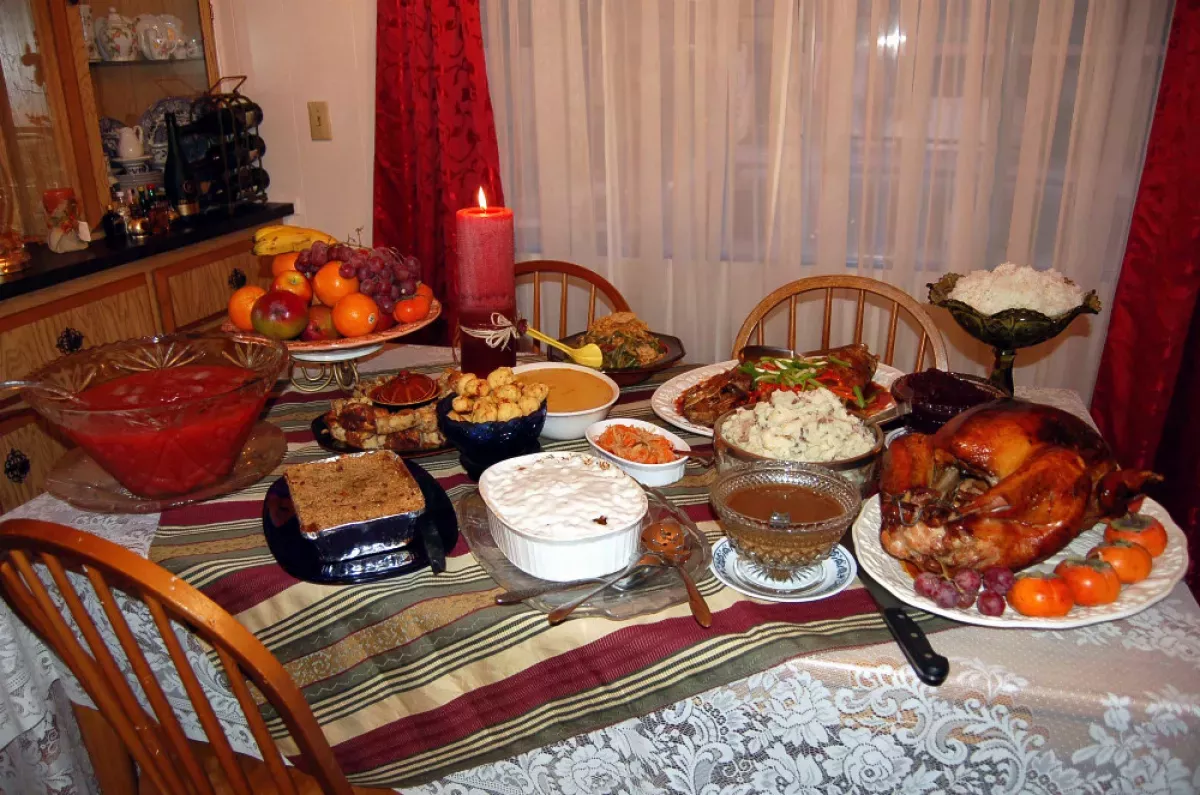Thanksgiving is a holiday celebrated in the United States, Canada, and a few other places. Celebrated in either October or November, Thanksgiving is rooted in giving thanks for the year's harvest and general blessings. Though it has religious and cultural origins, it's largely observed as a secular holiday. Harvest festivals of a similar nature occur worldwide in autumn.
1901: Philippines Observes Thanksgiving
In 1901, as an American colony, the Philippines began observing Thanksgiving as a special public holiday on the same day as the United States.
1909: Ambassador Nabuco observes Thanksgiving in the US
In 1909, Ambassador Joaquim Nabuco observed Thanksgiving commemorations in St. Patrick's Cathedral in Washington, which later inspired him to suggest the institution of a National Thanksgiving Day in Brazil.
October 31, 1939: President Roosevelt Changes Thanksgiving Date
On October 31, 1939, President Franklin D. Roosevelt signed a presidential proclamation changing Thanksgiving to the next to last Thursday in November, in an effort to boost the economy by lengthening the Christmas shopping season.
December 26, 1941: Congress Sets Thanksgiving as Fourth Thursday in November
On December 26, 1941, President Roosevelt signed a joint resolution of Congress changing the official national Thanksgiving Day to the fourth Thursday in November, starting in 1942, after the previous change in 1939 caused widespread disruption.
1941: Federal Legislation Formalizes Thanksgiving Date
In 1941, federal legislation by the United States Congress formalized Thanksgiving on the fourth Thursday in November.
1942: Thanksgiving Celebrated on the Fourth Thursday in November
In 1942, due to a joint resolution signed in 1941, the official national Thanksgiving Day was celebrated on the fourth Thursday in November. This change was made to standardize the holiday after a previous attempt to move the date caused controversy and confusion.
1945: Thanksgiving Celebrated in Secret
In 1945, during the Japanese occupation in World War II, both Americans and Filipinos celebrated Thanksgiving in secret.
1946: Philippines continues Thanksgiving Observance
In 1946, The Philippines continued to observe Thanksgiving as a special public holiday on the same day as the United States.
August 17, 1949: Brazil Institutes National Thanksgiving Day
On August 17, 1949, President Gaspar Dutra of Brazil instituted National Thanksgiving Day (Dia de Ação de Graças) through Law 781, influenced by Ambassador Joaquim Nabuco's experiences at a St. Patrick's Cathedral commemoration in 1909.
January 1957: Canadian Parliament Thanksgiving Proclamation
On January 31, 1957, the Canadian Parliament issued a proclamation for Thanksgiving, using similar language as in 1879, designating it as "A Day of General Thanksgiving to Almighty God for the bountiful harvest with which Canada has been blessed—to be observed on the second Monday in October."
1957: Canadian Thanksgiving Date Change
In 1957, the Canadian Parliament proclaimed Thanksgiving to be observed on the second Monday of October. This was done to prevent Thanksgiving from clashing with Armistice Day, which was usually held during the same week, especially after the First World War.
November 5, 1963: President Kennedy Acknowledges Thanksgiving Claims
On November 5, 1963, President John F. Kennedy issued Proclamation 3560, acknowledging the claims of both Virginia and Massachusetts regarding the origins of Thanksgiving, referencing the forefathers' thanks for safety, health, fertility, love, and faith.
1966: Brazil Establishes Thanksgiving Date
In 1966, Law 5110 established that the Thanksgiving celebration in Brazil would take place on the fourth Thursday of November. This date is celebrated by families of American origin and some Protestant Christian denominations.
1969: End of Thanksgiving Tradition
In 1969, the tradition of celebrating Thanksgiving in the Philippines as a public holiday on the same day as the United States came to an end.
1971: American Uniform Monday Holiday Act
In 1971, when the American Uniform Monday Holiday Act took effect, the American observance of Columbus Day has coincided with the Canadian observance of Thanksgiving.
1973: Thanksgiving Altered in the Philippines
In 1973, President Ferdinand Marcos issued Proclamation 1180, changing the date of Thanksgiving in the Philippines to September 21, repurposing the holiday as a celebration of his imposition of martial law a year prior.
1983: U.S. Invasion of Grenada
In 1983, the West Indian island of Grenada marks Thanksgiving Day on October 25. The holiday marks the anniversary of the U.S.-led invasion of the island in response to the deposition and execution of Prime Minister Maurice Bishop.
1986: End of Marcos Era
In 1986, with Marcos' ouster, there were no proclamations declaring the observance of Thanksgiving, and it ceased to be a public holiday in the Philippines.
Mentioned in this timeline

John F Kennedy JFK was the th U S President...

Martial law is the imposition of military rule in place...
Virginia a state in the Southeastern and Mid-Atlantic US lies...
Canada is a North American country the second largest in...
Massachusetts officially the Commonwealth of Massachusetts is a state located...

Columbus Day commemorates Christopher Columbus's arrival in the Americas on...
Trending

46 minutes ago The Highwomen Return: Carlile, Crow, Judd, and Spencer Reunite for Canyon Performances.

47 minutes ago Raphael Veiga's game impresses fans; Adapts to Mexico after leaving Palmeiras.
47 minutes ago Jalen Williams Injury Scare: Thunder Re-evaluating Hamstring After All-Star Break
3 months ago Titanic Passenger's Gold Pocket Watch Anticipated to Break Auction Records, Selling for Millions.

47 minutes ago Armando 'Hormiga' González's Goal and Missed Opportunity in Chivas vs. América Clash

2 hours ago Jacob Elordi's 'Wuthering Heights' film sparks debate with cringe press tour and changed ending.
Popular

Kid Rock born Robert James Ritchie is an American musician...

Pam Bondi is an American attorney lobbyist and politician currently...
Randall Adam Fine is an American politician a Republican who...

Barack Obama the th U S President - was the...
The Winter Olympic Games a major international multi-sport event held...

XXXTentacion born Jahseh Dwayne Ricardo Onfroy was a controversial yet...
